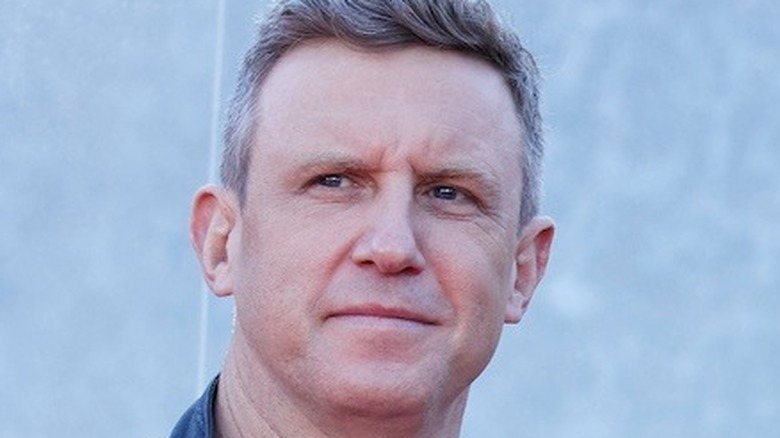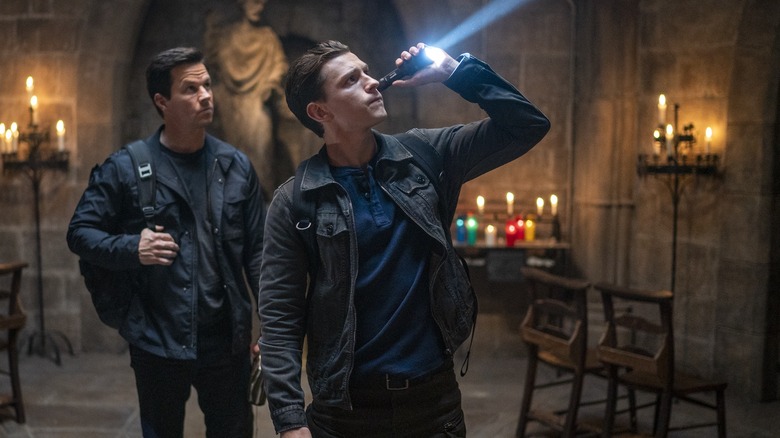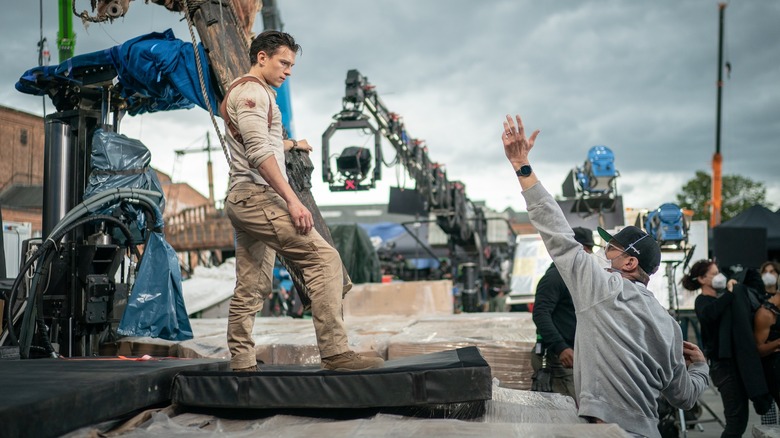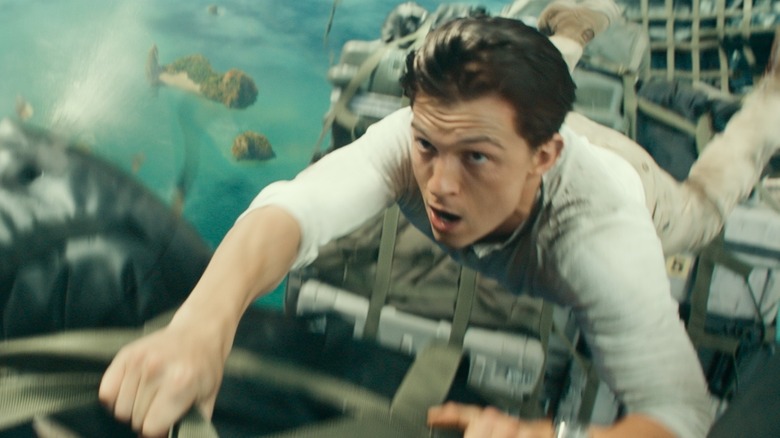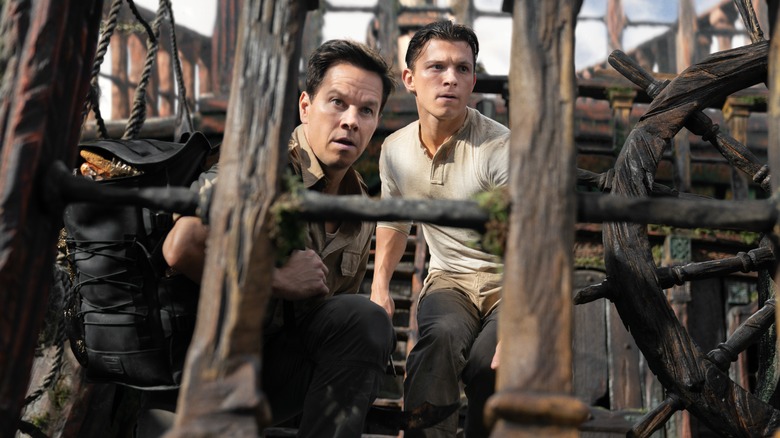Uncharted Director Ruben Fleischer Talks Adaptations, Action, And Tom Holland - Exclusive Interview
After an extended wait, "Uncharted," the movie adaptation of the beloved PlayStation video game franchise of the same name, has finally made its way to the big screen. The film isn't a direct translation of any of the stories from the video games but an origin tale for soon-to-be-adventurer Nathan Drake (Tom Holland) and his mentor Victor "Sully" Sullivan (Mark Wahlberg). Nonetheless, the film nods to the video games at several points with a plot that centers around a rip-roaring, globe-trotting treasure hunt featuring huge action sequences that will leave viewers breathless.
Directing the film is Ruben Fleischer, whose filmography includes box office darlings like "Zombieland," "Zombieland: Double Tap," and "Venom." While that background means he's no stranger to rollicking action or big-budget movie adaptations, he's gone bigger in every way with "Uncharted." In an exclusive interview, Fleischer spoke to Looper about how his experience on "Venom" helped him adapt "Uncharted," working with Tom Holland to develop the young version of Nathan Drake, and how he and his team created the film's epic action sequences.
Adapting video games and comics
Were you familiar with the "Uncharted" games before you started work on the film?
I had played the first "Uncharted" game when it came out, and at that time, I was much more into video games than I am now because I didn't have a career or children at that point. I played the first "Uncharted" game, but then the PlayStation went in the closet. When I got sent this script, I was thrilled to dust it off — or actually get a new one because it had evolved much past my console at that time — and see where the story had led and meet all these new characters and see the degree of the action it involved and how cinematic it had become, and lent itself to a movie so perfectly.
How did you go about finding the right balance in the film between nods to the video game, which there are quite a lot of, and ensuring the movie still works as a movie?
I was lucky to be able to draw from my experience working on "Venom" and adapting beloved source material, and knowing that, at the end of the day, it has to work as a film first, because no matter how authentic the adaptation may be, if it's not entertaining, then it's all for naught. I wanted to make sure it worked as a movie on its own two feet without having to rely on any knowledge of the video game, which is a great story, great characters, amazing action set pieces, everything that makes up one of these films.
At the same time, you have to pay tribute to the source material and make sure that it does satisfy those fans. You can't take it too far off its course from the original material and you want to fill it full with Easter eggs and nods and other cues that let people know that we know that we share the same love for the source material.
Is there a big difference between adapting a comic book like "Venom" and a video game like "Uncharted"?
I think it's specific to the project. I don't know if the approach is so distinctive. I think that it just has to be true to what you're setting out to do. With "Venom," it was perhaps easier because superhero movies are such an established genre that audiences love, whereas video game adaptations have not had such a storied history, let's say. I think it was a little bit more daunting with "Uncharted" because there is somewhat of a negative association with video game adaptations for films.
A hat tip to Tom Holland
How did you work with Tom Holland to bring to the screen this version of this very well-known character?
I've got to give Tom most of the credit, if not all, for the way he brought Nate to life. He really prepared himself physically and mentally to take on the role, and physically is very noteworthy because so much of that action he performs himself, and he's at the center of so many of those moments and those sequences doing truly death-defying things, whether it's hanging from a chandelier four stories above the ground or hanging on for dear life on a box, whether or not it's actually outside the back of a plane, looks like it's outside the back of a plane. He came ready to play.
He's also a massive fan of the games. I think — this predates my involvement with the project — but I think this all was spawned because he loved playing the games. From what I understand, he [pitched Sony the idea of Holland playing a young James Bond, which inspired the "Uncharted" adaptation]. He definitely came in with an intention, and I think it was perfectly realized.
A team effort
You mentioned the action sequences, which are amazingly choreographed. How did you plan, shoot, and collaborate with the actors and the stunt team to bring these amazing sequences to life?
Well, first and foremost, I've got to give credit to the writers for coming up with them because they were all, when I read the script, things that I wanted to see on screen, whether it's the boat battle at the end or the cold open where [Nathan Drake]'s hanging outside the back of a plane. They were all things that, as soon as I read the script, I was so excited to figure out how to achieve. The good thing is that we had the video game series as a reference point in terms of what the action should look and feel like, and they set the bar really high.
It really is a collaboration between all the different departments, whether that's cinematographer, the practical special effects on set — who are responsible for making things shake and move or blowing fans on people's faces so it feels like they're really racing through midair — or it's the stunt team, who's responsible for choreographing and rehearsing all of that action to the visual effects department who then has to take the material that we've shot and make it look like it's actually in midair.
It's why I love filmmaking, because you get to work with all these extraordinarily talented people in terms of realizing an idea, and everybody brings something to the table [that is] unique. They all have experience that I don't have, and I learned so much through the process. I'd never done half of this stuff before. I got to work with extraordinarily talented people and learned a lot in the process.
Bringing Nate and Sully together for future adventures
This movie is the potential beginnings of a larger universe and it's also the beginning of the relationship between Tom Holland's and Mark Wahlberg's characters, which in the games becomes a centerpiece. How did you work with the two of them to make sure that you could bring the beginning of that relationship to life here so it can continue in future installments?
Well, it was really important to me that we have that tag scene, the post-credits scene, which suggests that Nate and Sully, after this big adventure, are going to carry on with more adventures. I didn't want the movie to conclude with them just flying off into the sunset and perhaps that's it for Nate and Sully. They had forged this friendship and this partnership and I wanted audiences to leave the theater knowing that they would continue to go on more adventures together.
Throughout the process, the dynamic between the two is something that, whether it was through rehearsal or just through shooting, we made sure it was always at the forefront. I wanted to make sure, also, that audiences knew that this wasn't necessarily the only Nate and Sully story — that there would be, hopefully, more to follow.
What was the process with the actors to ensure that the Nate and Sully relationship could be brought to life in as realistic a way as possible since it's a bit different in the movie than it is in the video games?
I think that this was a classic buddy relationship that some of my favorite films are based upon ... that somewhat of an odd couple relationship that can lend itself to humor because of their strong differences. Sully's a classic been-there-done-that, older, wiser, more experienced [person], but also somewhat jaded and cynical person who's very self-interested and Nate's the younger, wet-behind-the-ears, excited about everything naif. That's a classic dynamic that I think lends itself really well to comedy and drama and friction and everything else. So it was inherent to both the characters that were scripted and the actors that we cast.
This interview has been edited for length and clarity.
"Uncharted" premieres exclusively in theaters on February 18.
